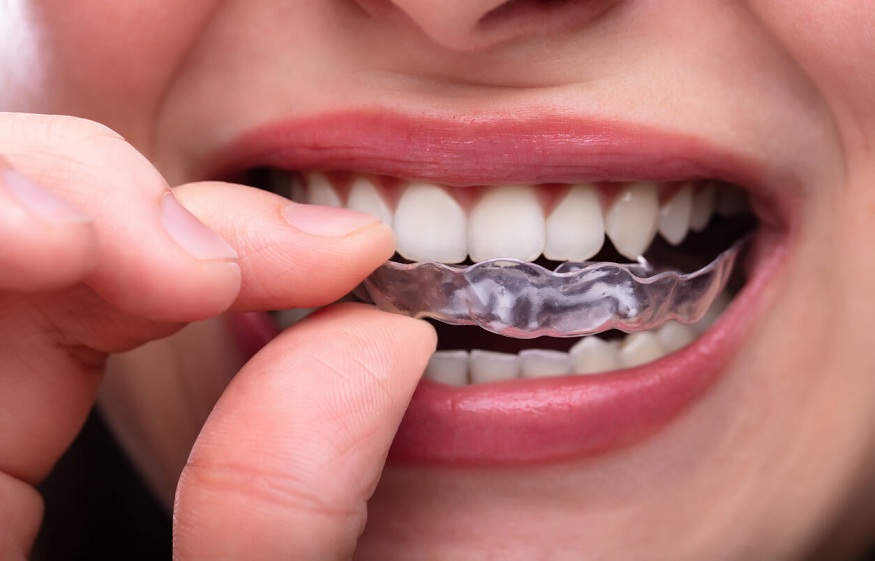What happens if you grind your teeth too much?

Whether you’re awake or asleep, if you clench your teeth, grind your teeth, or gnash your teeth, this behavior is referred to as bruxism in the medical community.
Grinding your teeth may not justify treatment if it is only done occasionally or lightly, but if it is done frequently or severely; it should be treated as soon as possible to prevent irreversible damage to the mouth, jaw, or teeth.
Continue reading to discover about the negative effects that grinding your teeth can have on your oral health and how they manifest themselves.
What is Bruxism?
Bruxism can happen when you’re awake or when you’re sleeping (or both). You might not even realize that you are clenching your jaw during the day.
You may find that you grind or gnash your teeth at night when you are very sleepy. Most people who grind their teeth at night don’t even know they are doing it.
Sounds like grinding or clicking can sometimes wake up a partner in the middle of the night and let them know what’s wrong. It’s possible that you won’t know about it until your teeth or jaw have been hurt.
Bruxism can show up in many different ways, such as headaches, jaw or face pain, tooth pain or sensitivity for no clear reason, cracks or chips in teeth for no clear reason, and tight jaw muscles.
Teeth grinding can be caused by a number of things, some of which are physical, some of which are mental, and some of which are even genetic. Stress, worry, and intense concentration are all things that could make your jaw muscles tight and clench up all day long.
Teeth grinding or gnashing can be caused by stress, a sleep disorder, hyperactivity, or even some drugs. It usually happens when a person is sleeping.
Negative Side Effects of Teeth Grinding
If you grind or clench your teeth frequently or to an extreme degree, it can lead to a number of dangerous side effects that are harmful to your mouth, teeth, jaw, and overall oral health.
In addition, it can disrupt the sleep of your spouse during the night, which could also affect your own sleep.
Jaw disorders
Teeth grinding can hurt the joints and muscles that make up the jaw, which can lead to temporomandibular disorders (TMD).
TMD can cause a lot of pain in the face, neck, and shoulders, and it can also make it hard to chew, talk, and swallow food and liquids.
Tooth damage
Teeth wear down and break when you clench and grind your teeth. If you grind your teeth too often, you can wear down the enamel and the surfaces of your teeth. This can make your teeth shorter and more sensitive.
When there is constant stress and pressure, teeth can also become cracked, chipped, broken, or loose. If you already have fillings, crowns, or bridges in your mouth, grinding can also damage them.
Headaches
The persistent stress and pressure that is imposed on the facial and jaw muscles as a result of grinding one’s teeth can lead to excruciating migraines and tension headaches.
Pain
Grinding your teeth places a significant amount of tension and pressure on your jaws and the muscles that surround them.
If you don’t address your habit of grinding your teeth, the pressure that builds up in your jaw usually results in pain and stiffness there.
Nevertheless, if you don’t, it can also lead to headaches, toothaches, neck and shoulder pain, and even earaches.
Temporomandibular Disorders
You may have discomfort in your jaw, but you may also develop temporomandibular disorders (TMD) if you grind your teeth (TMDs).
These conditions can cause pain in the jaw, neck, and face, which can make chewing, speaking, and swallowing difficult.
Tooth Damage
When you grind your teeth, you run the risk of causing damage to your teeth. The enamel on your teeth can be worn down by grinding your teeth too frequently, which can cause your teeth to become shorter and more sensitive. Although teeth are naturally fairly tough, this can happen if you do it often enough.
Grinding your teeth excessively might even develop cracks in your teeth and cause damage to any fillings, crowns, bridges, or dental implants that you currently have in your mouth.
Moreover, it can cause teeth to move and become loose over time, which might ultimately result in the loss of teeth.
Gum Recession
Grinding your teeth can cause your gum line to recede.
Sleepless Nights
Many people who grind their teeth do so in their sleep. While some people sleep through their excessive grinding, it can keep others up at night, especially when it starts to cause chronic pain.
Wearing down of the enamel
When teeth grinding is in its early stages, it can cause the enamel on your teeth to wear away. This is one of the harmful effects of teeth grinding.
Because enamel cannot be replaced, it is critical to maintain as much of the natural enamel as possible throughout life.
Tooth chips and cracks
Grinding your teeth together can cause chips, cracks, and other types of damage to your teeth over time.
This not only compromises the structural integrity of your teeth but also makes them more prone to tooth decay as a result of the condition. In extreme circumstances, the harmful effects of teeth grinding might include the loss of teeth or even shaky teeth on the affected individual.
Damage to your jaw
The problem isn’t just with your teeth, unfortunately. Bruxism can cause long-term damage to the jaw, which can cause pain, limited movement, and a clicking sound when the mouth is opened and closed.
How Can Bruxism Cause Permanent Damage to Your Teeth?
Pain in the head, jaw, and teeth can be caused by clenching and grinding your teeth on a regular basis. Headaches can also result from this behavior.
If you don’t get help for bruxism, it will slowly wear away the enamel on your teeth and cause you to grind the tops of your teeth, which can lead to wear, chips, and cracks.
Once the thickness of the enamel has been reduced, the chance of getting cavities goes up. Grinding your teeth can cause a number of dental problems, such as cracks and the risk of wearing down your teeth to the point where you need a crown to fix them.
Grinding your teeth can cause wear that can ruin the appearance of your teeth, which may require cosmetic and restorative operations such as veneers. Grinding your teeth can also cause headaches and jaw pain.
Avoiding the negative impacts of teeth grinding
Since bruxism is an unconscious behavior, it can be very hard to stop grinding your teeth. The most important thing you can do for your oral health is to protect your teeth from the long-term damage that comes from grinding your teeth.
Some dentists give their patients the option of getting custom-made mouth guards or bite splints. You can wear these at night to keep your teeth from grinding together and to absorb the force of grinding your teeth while you sleep.
Awake bruxism is a little harder to control, but things that have been shown to help relieve stress have been shown to help.
In some cases, you may also be given muscle relaxants to help ease the tension in your jaw muscles. Here are some more ideas that should help you cut down on how often you grind your teeth:
- Less caffeine and other products with stimulants.
- Less alcohol.
- Stop chewing on things like pencils, pens, ice, and gum when you shouldn’t.
- If you know you grind your teeth, you can try putting your tongue between your teeth to help relax your jaw and stop you from biting down.
Final words
It might not seem like a big deal to grind your teeth, but it can lead to long-term problems with your mouth if you don’t stop.
There are treatments for people who grind their teeth or clench their jaws, which is a good thing. Some of these treatments deal with the bad effects of teeth grinding, while others may be able to get rid of the habit of grinding your teeth for good by retraining your brain.
If you think you can’t stop grinding your teeth while you sleep, talk to your dentist about getting a night guard or splints to protect your teeth from the damage that grinding your teeth can cause.
If the damage to your teeth is really bad, your dentist might also reshape your teeth or use crowns to fix it. Depending on how bad the damage is, both of these choices are possible.






